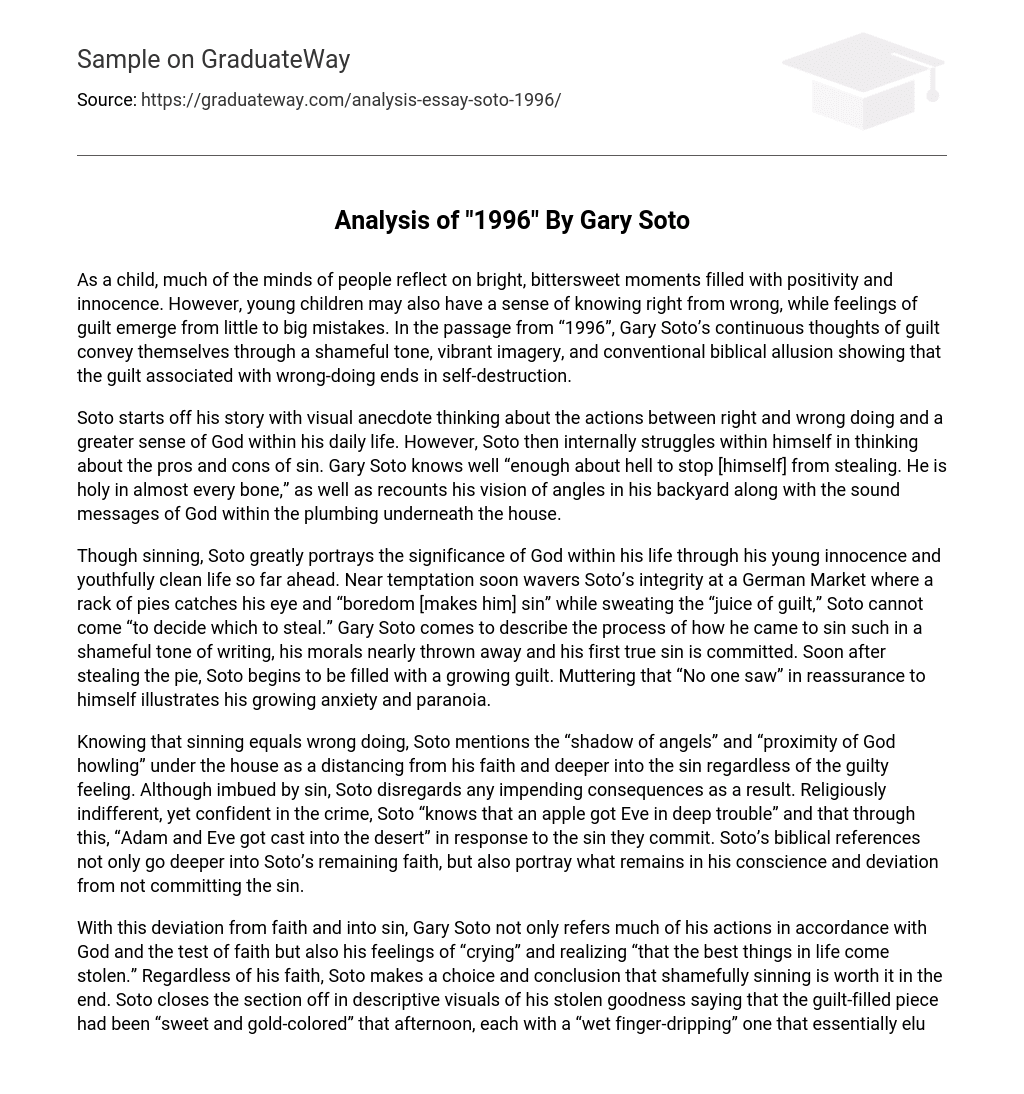As a child, much of the minds of people reflect on bright, bittersweet moments filled with positivity and innocence. However, young children may also have a sense of knowing right from wrong, while feelings of guilt emerge from little to big mistakes. In the passage from “1996”, Gary Soto’s continuous thoughts of guilt convey themselves through a shameful tone, vibrant imagery, and conventional biblical allusion showing that the guilt associated with wrong-doing ends in self-destruction.
Soto starts off his story with visual anecdote thinking about the actions between right and wrong doing and a greater sense of God within his daily life. However, Soto then internally struggles within himself in thinking about the pros and cons of sin. Gary Soto knows well “enough about hell to stop [himself] from stealing. He is holy in almost every bone,” as well as recounts his vision of angles in his backyard along with the sound messages of God within the plumbing underneath the house.
Though sinning, Soto greatly portrays the significance of God within his life through his young innocence and youthfully clean life so far ahead. Near temptation soon wavers Soto’s integrity at a German Market where a rack of pies catches his eye and “boredom [makes him] sin” while sweating the “juice of guilt,” Soto cannot come “to decide which to steal.” Gary Soto comes to describe the process of how he came to sin such in a shameful tone of writing, his morals nearly thrown away and his first true sin is committed. Soon after stealing the pie, Soto begins to be filled with a growing guilt. Muttering that “No one saw” in reassurance to himself illustrates his growing anxiety and paranoia.
Knowing that sinning equals wrong doing, Soto mentions the “shadow of angels” and “proximity of God howling” under the house as a distancing from his faith and deeper into the sin regardless of the guilty feeling. Although imbued by sin, Soto disregards any impending consequences as a result. Religiously indifferent, yet confident in the crime, Soto “knows that an apple got Eve in deep trouble” and that through this, “Adam and Eve got cast into the desert” in response to the sin they commit. Soto’s biblical references not only go deeper into Soto’s remaining faith, but also portray what remains in his conscience and deviation from not committing the sin.
With this deviation from faith and into sin, Gary Soto not only refers much of his actions in accordance with God and the test of faith but also his feelings of “crying” and realizing “that the best things in life come stolen.” Regardless of his faith, Soto makes a choice and conclusion that shamefully sinning is worth it in the end. Soto closes the section off in descriptive visuals of his stolen goodness saying that the guilt-filled piece had been “sweet and gold-colored” that afternoon, each with a “wet finger-dripping” one that essentially elucidates itself as “the best thing [he] ever tasted.”
To Soto, the sin proves to be worth every piece and bite slipped into his mouth, but despite Soto’s vivid imagery, guilt soon continues to take over Soto’s thoughts as he recalls the setting of the German Market and the rack of pies that tempted him from the start. Even though Soto dispels sin and consequence, and guilt soon takes further control. Once Soto finishes the pie, every essence of guilt rushes over him, little by little. Sitting on the curb, Soto feels that his face becomes “sticky with guilt” and continuously flings his Frisbee, feeling as if its shadow heightened like an angel “fleeing bad deeds.” Along with this shame-filled tone, Soto details the anxious feeling in his head that still associated with the sin. Soto reflects and continues to feel more guilt as he heads home, where he feels that his mother, “peeling a mountain of potatoes” and the neighbor Mrs. Hancock standing on her lawn, “knew.”
Such guilt overcomes Soto to a point where his conscience vividly describes and concludes that he isn’t the only one who knows about the stolen pie. Soto like the usual, crawls underneath the house again, and starts to question his faith once more. The howling of the plumbing, “was it God?” As his faith proves in the end, Soto knows that “sin was what you took and didn’t give back.” Emerging from under the house and seeing the pie tin once more, Soto’s guilt never really leaves him, and only comes to bite his conscience back once more.
After guilt actions, shamefulness, and self-destruction within a young child comes into play, more than just an experience occurs. God plays an important part in Soto’s life as a child, as depicting biblical references allows him to contemplate the integrity juxtaposed towards his faith and simply solidifies the faith within.





